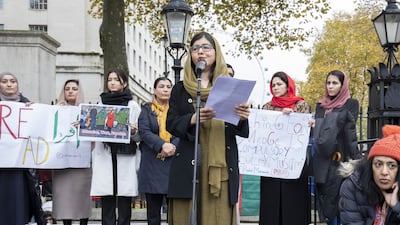Malala Yousafzai has urged the UK government to establish asylum and resettlement routes for women at risk.
The Nobel laureate, who was shot by Pakistan’s former Taliban spokesman in 2012 for campaigning for education for girls, made the comments at a rally in London at the weekend, when she urged a bolder approach from the government.
"Demand the release of women activists in Afghanistan and welcome at-risk Afghanistan women by establishing asylum and resettlement routes," the 25 year-old said.
Britain opened the Afghan Citizens Resettlement Scheme (ACRS) at the beginning of this year.
The scheme prioritises those who have assisted UK efforts in Afghanistan and stood up for values such as democracy, women’s rights, freedom of speech, rule of law and vulnerable people, including women, girls and members of minority groups at risk.
The government plans to resettle more than 5,000 people in the first year and up to 20,000 over the coming years.
But the policy has been criticised by MPs for failing to prioritise the most vulnerable Afghans, including those who helped the UK, with a House of Commons committee report calling it a “betrayal of our allies”.
Many were left behind after Nato's withdrawal, forcing them to seek unsafe routes to reach British shores. Figures show the number of Afghan asylum seekers crossing the English channel in small boats has risen five-fold in the past year.
Ms Yousafzai on Sunday told the rally in Westminster, central London, that the global "silence" on women's rights in Afghanistan and fragmented approach had allowed the Taliban to increase their oppression of women and girls.
"To the UK government, step forward more boldly and live up to your claim to be a global champion for girls' education and gender equality," she said.
"Use your convening power to hold a global summit where world leaders can agree on bold and co-ordinated actions to ensure women and girls' rights are upheld in Afghanistan.
"Each of us who have the freedom to speak must not look away. We must call on our leaders to act with urgency."
She also urged others to speak out in support.
"We will go safely to our homes," she said. "For them, defying the Taliban means risking their lives.
"We cannot allow their sacrifices to be in vain. We cannot allow a generation of girls to give up on their dreams and disappear behind the walls of their houses."
Her speech came after protesters marched from Park Lane to Downing Street, carrying placards reading: "Women's rights are universal rights" and chanting: "Free Afghan women. We want justice. We want freedom."
Marches also took place in cities in Canada and the US.
Fawzia Koofi, Afghanistan's first female Deputy Speaker and peace negotiator, also called on the UK government to provide more support for Afghan women and girls and warned that failure to respond could lead to another 9/11 attack.
The Rise of Malala, the youngest ever Nobel laureate — in pictures
"We said [the] Afghanistan war was not an Afghan war. It is going to come to your borders," Ms Koofi told the crowd.
"If you continue to abandon women of Afghanistan, if the world turns a blind eye to what's happening in Afghanistan, then god forbid we will experience another 9/11.
"Afghan women are fighting for Afghanistan. They are not only fighting for education — education is the fundamental human right, in fact, it is the basic Islamic right for everyone."
Other speakers included Ms Yousafzai's father, education activist Ziauddin Yousafzai, journalist and political commentator Ayesha Hazarika and human rights activist Horia Mosadiq.
Zehra Zaidi, executive director of Action for Afghanistan, said the campaign groups behind the protest were planning to deliver a letter to Prime Minister Rishi Sunak, asking him to "lead this call" for a global conference and to establish a specific asylum route for vulnerable Afghan women.
The group's co-founder Kathleen Mulhern said its members would “push [the UK government] like crazy.
“We are not letting them off the hook."


